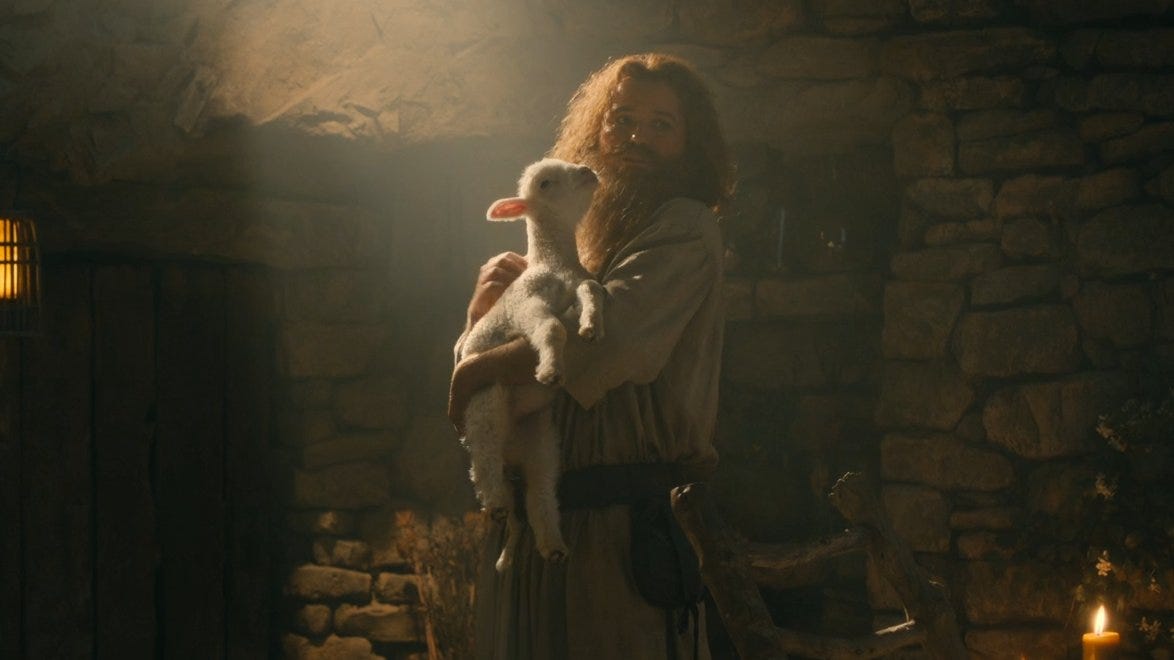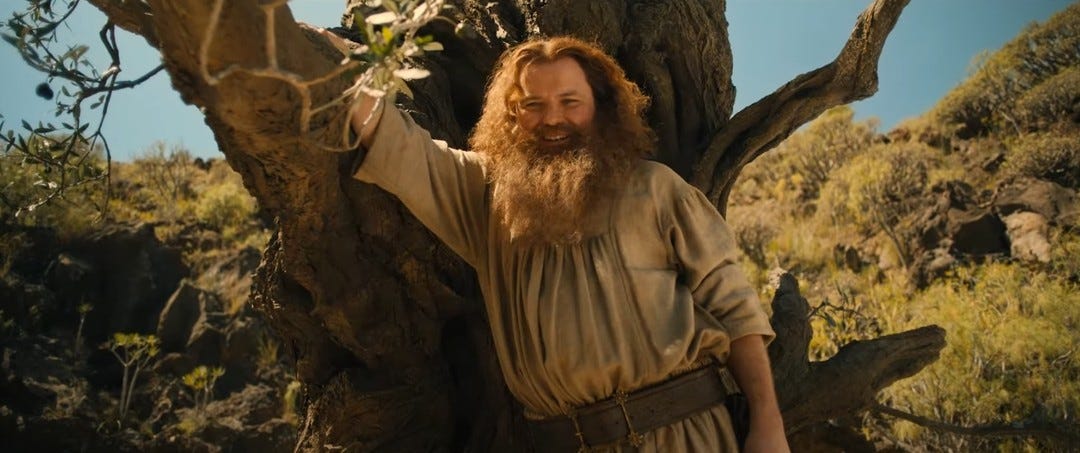
I admit that I’m probably misusing the concept of the Deep Magic, which C.S. Lewis gave us in The Lion, the Witch and the Wardrobe and then subsequently never really brought up again. But there is something…fascinating about the idea of primordial forces that are older than the universe. This idea runs throughout The Lord of the Rings, and not just because the story takes place upon the ruins of the Elder Days; in Tom Bombadil, the Ents, Shelob, Old Man Willow, we have visions of even older and greater powers than the Elves and Dark Lords. Rings of Power’s second season has already touched upon this idea by showing us things even older and grander than we’ve imagined by giving us Cirdan (Ben Daniels), an elf so old he can grow a beard. But if there was one theme that I would say that Episode 4 has shown us, it can be deduced by the title: “Eldest.” There really is a deep magic that bubbles throughout this episode, one that may not actually help with the forward progression of this story in general, but one that makes this world come to life even more than it already does, shows how much this is a subcreation of Tolkien, and just in general provided much giddy joy to the people who love this work. And there was a lot for me to love here, even if I still think this may have been the weakest of the episodes; and on reflection, it is growing on me.
Let’s start with Tom Bombadil (Rory Kinnear), chronologically the first sign of the “Deep Magic” we meet, through the eyes of the Stranger (Daniel Weyman) as he tries to find his Harfoot friends separated by a sandstorm. Tom was…very nearly perfect. And I say this as somebody who thinks he brings the story of The Fellowship of the Ring to a screeching halt and would have killed the forward progress of a movie; cutting him is honestly one of Peter Jackson’s most defensible choices. But in a prestige television show where he doesn’t hijack the main storyline and is allowed to just be himself, the personification of Tolkien’s love and reverence for nature? That’s just the ticket. And Tom was a delight; jolly, kind, wise, somewhat confusing, and with a core of iron, and all at the same time. Even the Dark Wizard (Ciaran Hinds), when he learns that the Stranger has joined forces with Tom, now opts to move with caution and sends his Easterling mercenaries after easier targets. Which is a good thing, since as the Stranger showed in an encounter with Old Man Willow’s ironwood cousin (here imagined not so much as a malevolent force of nature, but as something of an annoyed guard dog, to hilarious effect), he’s still not close to having a firm grasp of his powers, and will need time and a teacher. And just as is the case with Tom in the books, Tom in the show brings questions that we may never find the answers to. Like, how long has he even been in Rhun? And how could Goldberry’s voice be heard in song even as she herself was absent?
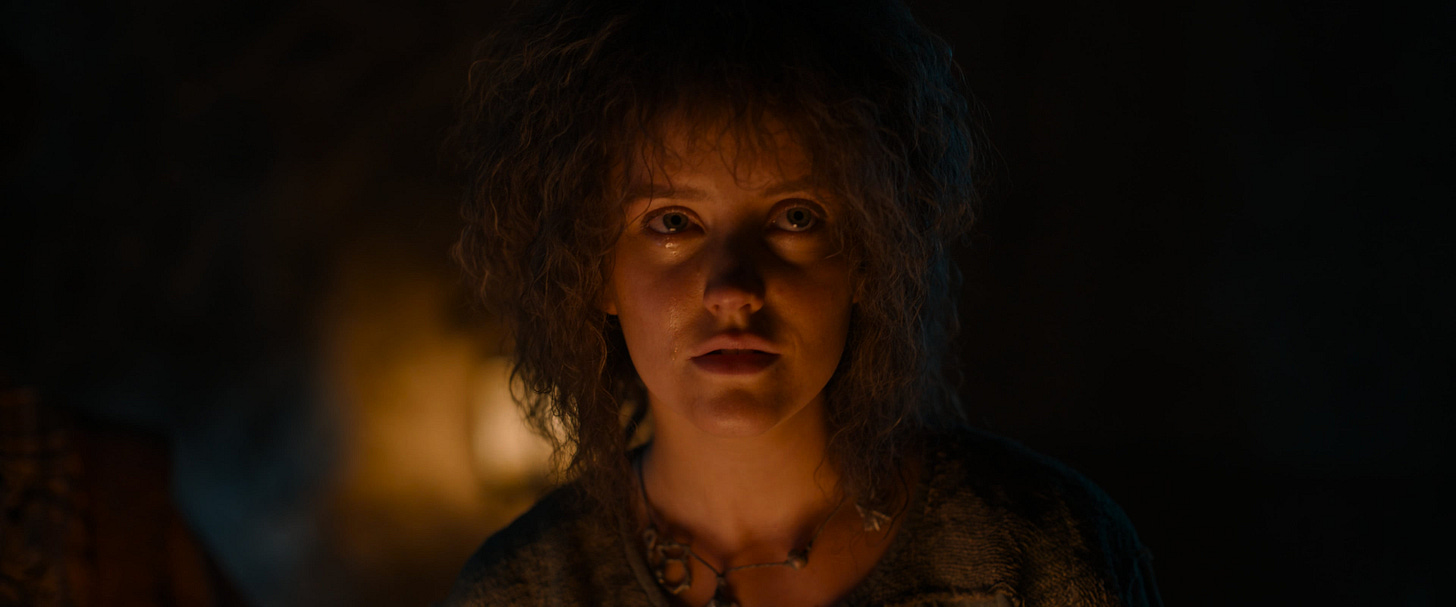
For their part, Nori (Markella Kavenagh) and Poppy (Megan Richards) have their own encounter with ancient things. First off, emotions, as the first person they encounter after the sandstorm is the rather dorky Stoor1 Merimac (Gavi Singh Chera) and Poppy essentially falls in love at first sight; Nori’s reaction is quite funny to watch. Then, societal norms, as Merimac reluctantly leads them to his village, where the matriarch Gundabel (Tanya Moodie) opts for the time-honored custom of being suspicious of outsiders and letting them fend for themselves2; as Nori ruefully admits, Sadoc Burrows, the deceased former leader of the Harfoot caravan, would probably have done the same. And finally, history; the name of Sadoc breaks Gundabel’s iron resolve just a tiny bit, and she shows Nori a wall mural with the history of the Stoors. Sadoc’s name rung a bell because his distant ancestor Rorimas had, years ago, struck out from the hard lands of Rhun with a caravan of followers seeking a “Suzat”, a home with abundant water and rolling hills; in another instance of the showrunners actually knowing their lore, this is not just an homage to the Shire, this is straight up the Shire itself, making use of its name in the Westron language. Nori has to regretfully tell Gundabeld that Rorimas never did find the Suzat; but what’s even more tragic and poignant are Nori’s tears as she realizes that Harfoots were never meant to wander, but have been wandering in search of Eden that they just haven’t found yet. This is a heartbreaking visualization of one of Season 2’s biggest themes, the importance of home and belonging; we can only hope that by the show’s end, Nori will find a home.
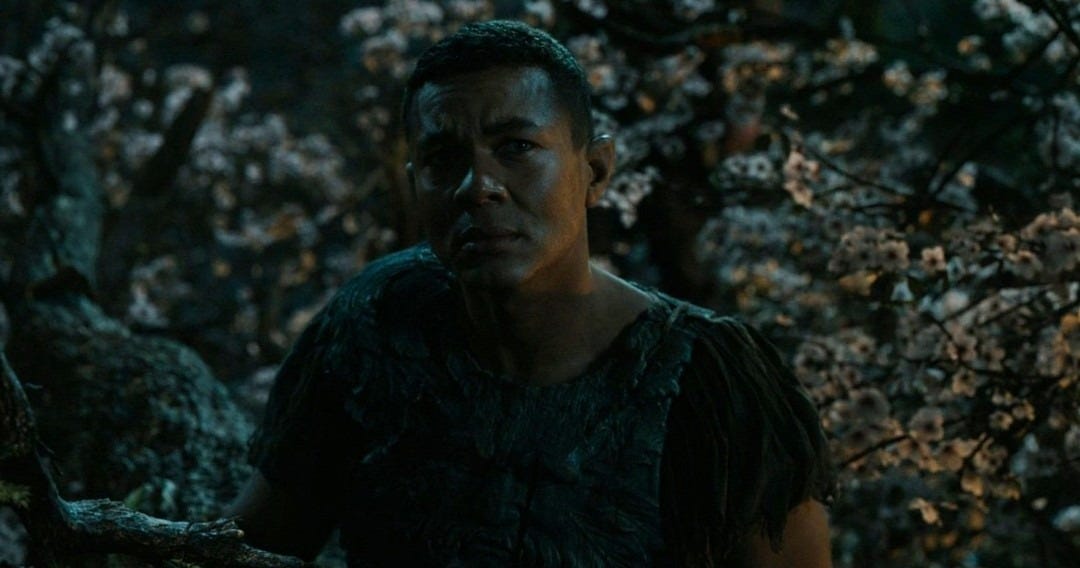
On the other hand, a more direct encounter with ancient powers ends up giving Arondir (Ismael Cruz-Cordova) closure and peace. You’ll remember that last episode, after Isildur’s (Maxim Baldry) faithful horse Berek was stolen by wild men in the No Man’s Land between Mordor and Pelargir, he and Theo (Tyroe Mufahidin) had launched a rescue mission; it had started to go south but then had gone very strange, as something very big and creaky scattered the horse thieves and snatched up Theo. So Isildur and Arondir have to launch another search-and-rescue mission, which after an unwelcome revelation about Isildur’s new crush Estrid (Nia Towle) and a messy encounter with Shai-Hulud’s muddier cousin, culminates in a run-in with two very angry Ents, Snaggleroot (voice of Jim Broadbent) and Winterblossom (Olivia Williams). Who knows how old these two Ents are, how long they’ve roamed this part of the world taking care of these forests? No wonder people taking axes to these trees has gotten them so riled up. And one of these people is Arondir himself, who back in Season 1 had been forced to cut down a tree to save his friends from being slaughtered by orcs; a necessary evil, but one that has clearly haunted him to this day. But facing these ancient shepherds of the forest finally gives him the opportunity to confess his sorrow and promise to make amends in the future; not only that, he even has the chance to speak words of healing to Winterblossom, calming her and her husband and convincing them to release Theo (since they were the ones who had snatched him up in their anger). This whole scene was just…wonderful. It homaged Tolkien’s famous love of trees and all growing things; it finally gave Arondir something to do other than merely look fabulous; and it honored Bronwyn’s legacy, as her memory is part of what inspires Arondir and Theo to reconcile. Arondir even has a new mission, for the main reason why Snaggleroot and Winterblossom are so angry is because an army of orcs is on the march, and if you remember The Two Towers, you’ll know what orcs do to trees. Arondir immediately puts together that this is Adar (Sam Hazeldine) and his “Great Heathen Army”, and decides that he has to find out what they’re up to; maybe he can even have a reckoning with Adar himself.
But Arondir isn’t going to be the first elf to encounter Adar and his host. That honor goes to a ranging company of elves led by Elrond (Robert Aramayo) who have been sent out in response to Galadriel’s (Morfydd Clark) intuiting that there is something rotten in the state of Eregion. And the sighting comes at the tail end of their own encounter with something old, this time fell and dangerous; their path ends up taking them through the Barrow-downs, and just as Frodo and companions were attacked by the mysterious barrow-wights who call those tombs home, so is Elrond’s company. Unfortunately, this scene was honestly somewhat underwhelming. They were scary, sure, thanks to their creature design and Bear’s soundtrack for this scene, and it was good to be able to see what was going on (as opposed to the Long Night in Game of Thrones’ final season); but some of the abject terror of the atmosphere we get from the books was lost when we actually got to see them in the undead flesh. And, considering that this is technically the first time anyone has encountered them, they are dealt with far too easily, thanks to Elrond somehow having access to lore about a creature that’s never been seen before; and it’s not even the correct lore, wherein the only way to defeat a wight is to break open its barrow and expose its treasure to the sun and free air. And did we really need the old horror movie trope of the Black Guy being the first to bite it?3
But the barrow-wights are only there for a few minutes. We are stuck with Elrond for a much longer period of time. And he is still being an ass to Galadriel. While you may remember from my review of the premiere that I didn’t agree with him one bit, at least in the first two episodes I could understand it as him trying to work through his hurt feelings as he felt betrayed by her. But then he had his conversation with Cirdan, where the elder Elf spoke of the virtue of humility, of trusting the innate goodness of his friends, and in not turning them away but guiding them to the light. And at the very beginning of E2, and the very start of E4, it looked like that wisdom was sinking in. Well…I was wrong. The entire reason the company ends up going through the Barrow-downs is because Elrond deliberately chose that way in direct response to Galadriel urging them not to walk into a trap; even considering that her intuition is being enhanced by the Ring she wears, she is still the most battle-experienced member of the company, and deserved better than to be ignored out of hand, indeed spited. And this is only the first time this episode that Elrond still insists on doubting Galadriel’s purity of heart and commitment to the “Great Task”; even at the end, where she reaffirms that the Three are not the pure evil he thinks they are and moreover that Nenya has no power over her, he goes out of his way to doubt her, in a way that hearkens back to his cruelty in the premiere. I swear, by this point Elrond without a ring is worse than Galadriel, Gil-galad and Cirdan with one. I know he has an arc, and Elrond’s motif showing up in “Last Temptation” by Bear McCreary indicates that he will come around by season’s end, but my goodness it is taking far too long.
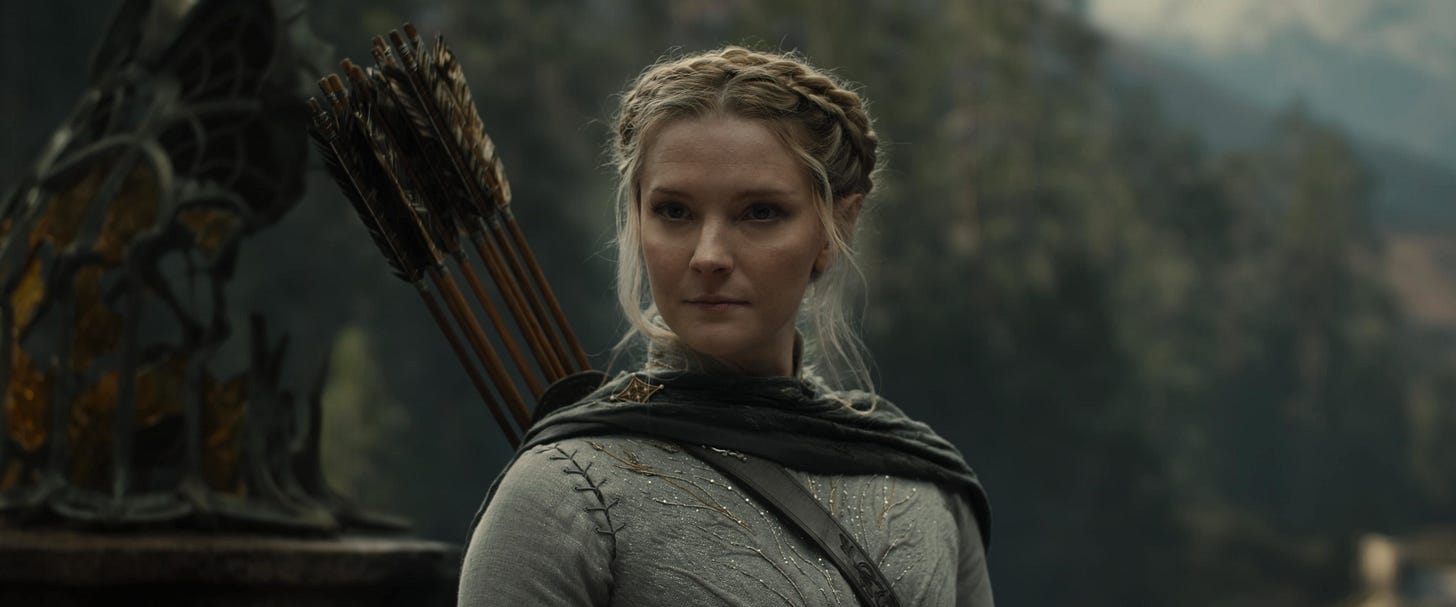
But, to end on something of a high note, although Elrond continues to disappoint, Galadriel (who, in keeping with this essay’s theme of ancientry, is the oldest elf we spend time with) continues to delight, not only in her character but in her physical appearance and martial prowess. We finally get to see her in the “golden crown” that Tolkien wrote about to Catharine Findlay and that was promised us all the way back in May, and in a bravura night-time action sequence she shows why Amazon kept falling back on it for all three trailers and at least two 30-second TV spots. She has a moment at the beginning where she and Elrond are discussing their mission and she is delightfully sassy to him, in a way that we honestly could use more of from Elves. Even as Elrond goes out of his way to reject her good advice to not go through the Barrow-downs, she sucks it up and goes along because “I would not see any of this company slain, including you”; given how pointed she can be, I think this choice of words, as opposed to the “even you” that I would probably have used in her place, is intentional. As the company recovers from the Barrow-wights, she has a lovely scene with Elrond where she reaffirms that her priorities, a commitment to protecting all that is fair and fragile in the world, are straight. And although Elrond might stubbornly choose to doubt her using Nenya to heal one of their company from a stray arrow in the gut, and then voluntarily giving it up to him before throwing herself at an entire orc company to buy the Elves time to escape, we at least can see that these actions show she has indeed not been “corrupted in heart or faith.”
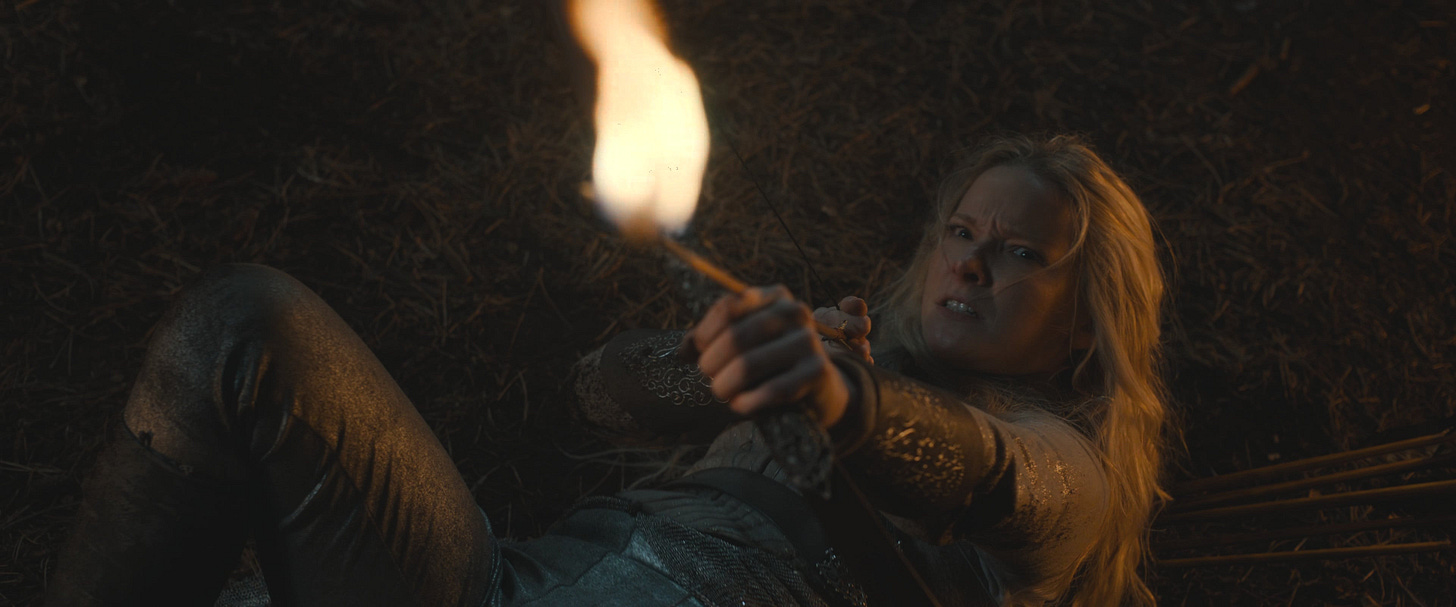
And that action scene, although it could probably have lasted like a minute longer, ends in yet another nod to ancientry, and one that had the more nerdy members of the fandom squealing for joy. Galadriel is more than a match for the Orcs and probably could have wiped out the entire company herself, except that Adar himself shows up with a greeting that stops her: “Elen síla lúmenn’ omentielvo, herūnī Altáriel,” Quenya for “A star shines at the hour of our meeting, Lady Galadriel.” Two things about this. The name “Altáriel” is not found in either the Trilogy or the Appendices, but rather in Unfinished Tales, showing that RoP’s agreement with the Estate that allows them to tap into the wider legendarium on a case-by-case basis is still going strong4. And Adar seemingly pronouncing síla with a lisp is a direct homage to “The Shibboleth of Feanor” from History of Middle-earth, where one of the many areas that Galadriel clashed with her uncle Feanor (culminating in her actually taking up the sword against him at Alqualonde) concerned this exact point of phonetics. This is something only a true Tolkien nerd would get, and proves how seriously the writers of Rings of Power take and know this world.
And with that…we are halfway done with this season. I know, it doesn’t really feel like it, rather that we just started; that’s what happens when the premiere is 3 episodes. Things have certainly been happening this season, unlike some other second seasons. But even bigger things are in store. Adar and his host are at the gates of Eregion, and they have Galadriel; this is going to be an awkward reunion, considering what happened the last time these two captains were in a room together. Elrond has to make a choice, whether he will continue to hate and judge Galadriel or whether he will finally honor his word to trust her. The Stranger has a new friend, one who might actually help him learn more about himself; meanwhile, how will Nori react to this history lesson that she has received? And all the while, Sauron is still active, still doing nefarious things, and the Dwarves are about to discover that the Seven Rings he has crafted are double edged swords; meanwhile, there’s the palace coup that just happened in Numenor, which is bound to have consequences. In a way, it’s good that this episode was a bit slower and lighter; we need some rest before things really start to go bang later in the season. Let’s see whether this starts next episode.
All images ©2024, Amazon Studios, unless otherwise indicated.
For Further Reference
Felicia Day, “Inside the Rings of Power: S2, E4”
Directors UK, “Making the Impossible, Possible: Louise Hooper on directing The Rings of Power”
Aaron Earls, “Rings of Power, ‘Eldest’ Reveals Distance Between Goodness and Safety”
Jolkien with Tolkien, “Is 'The Rings of Power' Worthy of the 'Tolkien' Name?”
Nerd of the Rings, “Rings of Power Season 2, Episode 4 Breakdown”
Daniel Stride, “Bright Blue His Jacket Ain’t But I Love This Fellow: A Review and Analysis of The Rings of Power Episode 4 (Season 2)”
Tea with Tolkien, “Episode 204: The Rings of Power Season 2 Review & Breakdown”
Thank you for reading The Tales That Really Matter. Please feel free to check out our Facebook, Instagram, Threads and Substack Notes profiles as well, that way we can continue to grow and reach more minds and hearts 😊
Another of the three breeds of Halfling that would, along with the Harfoots and Fallohides, come together to make the Hobbits we all know and love.
This is in keeping with the matriarchal nature of Stoors compared to Harfoots and Fallohides; indeed, Smeagol’s grandmother was the matriarch of their community, in addition to being the head of their family.
Although the existence of Barrow-wights in the show is not the travesty some people on the internet claim it is; the Barrows long predate the Dunedain of Arnor, and with Sauron the Necromancer in Eregion, right next door, it makes perfect sense that he would employ necromancy as one of his tools to isolate Celebrimbor from the outside world. I’m just a bit underwhelmed by the execution is all.
Some people think that this greeting also means that Adar may know something about where Celeborn, Galadriel’s husband, is. It’s possible, but not because of this name; Celeborn, in the version of the story where he is a Telerin prince, called her Alatáriel, not Altáriel. Most likely, Adar was just flexing.




